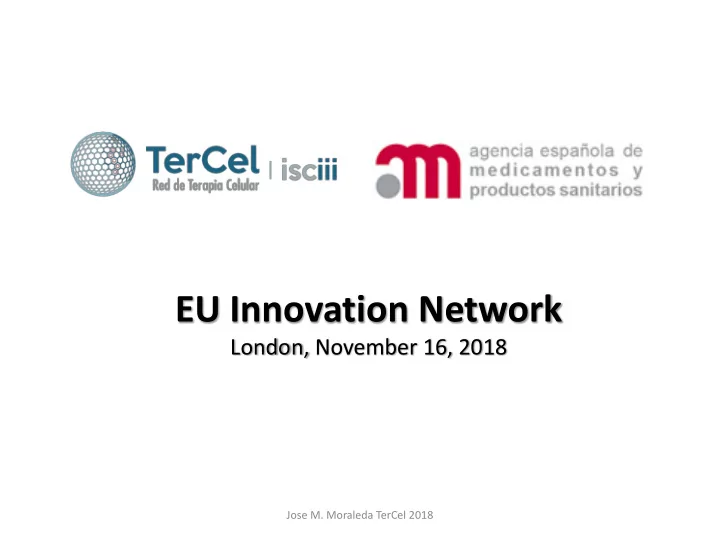

EU Innovation Network London, November 16, 2018 Jose M. Moraleda TerCel 2018
TerCel from Hubble TerCel 2016-2020 32 groups 8 regions accross Spain 362 clinic & basic investigators 3 Programs CardioCel NeuroCel OshiCel • Mission: Promote collaborative research in Cell Therapy and translate this knowledge to the clinic for the benefit of patients Jose M. Moraleda TerCel 2018
Scientific Strategy Basic research: Repair & First in human Regeneration clinical trials mechanims CardioCel Neuro- OshiCel Cel GMP advanced Develop cell therapies therapies to WP2. WP3. manufacture. WP1. Basic repair tissues & Preclinical Clinical Science Studies Trials Clean rooms cure diseases Proof of concept in animal models Jose M. Moraleda TerCel 2018
Clinical Trials • Phase I-II 2012 Mar 13. Neurotrophic Bone Marrow Cellular Nests Prevent Spinal Motoneuron Degeneration in ALS Patients: A Safety Study TRANSPLANTATION 2016 Sept 21. Intervertebral disc repair by allogeneic mesenchymal bone marrow cells: a randomized controlled trial. • Phase III Spain RD 2183/2004 and 1301/2006 transposition of the European Directive TerCel: GMP CELL MANUFACTURING FACILITIES: 8 certified “clean rooms”
Clinical Trials ASC Clinical Development in fistula 2002 2003 2004 2005 2006 2007 2008 2009 2010 2011 2012 2013 2014 2015 2016 2017 2018 Preclinical Proof of 1 case 1 case Concept 1 center 1 center 10 cases 8 cases Entero-Cut Phase I 1 center 1 center 24 cases CX601 10 cases 3 centers RVF 1 center 10 cases RVGF 1 center Phase II 50 cases 10 cases 3 centers ULTRA 1 center 207 cases 278 cases FATT1 Phase III 20 centers ADMIRE 30 centers X ADMIRE II Autologous 210 cases 80 cases FATT2 FISPAC 22 centers 5 centers Allogenic ACADEMIC TRIAL INDUSTRY TRIAL
Academic Clinical Trials Critical vision from the principal What can we do : investigators: • Excellent safety profile • Low quality control during the – Dose increase. Repeated doses study • Cell mortality • Low implication of CRO – Improving methods of delivery • Low implication of participants • Soft effects: • Worse patients selection.. – Cell product improvements (next generation of cells) • Improve effect: cell ingeniering May be academy is not the best • Improve traffic: fucosilation place for advanced trials? • Design robust clinical trials Lack of translational research – CRO implication from the beginning … nevertheless we can translate to – Patient selection industry trials from early studies! – IP education and implication
The biggest challenges of carrying out academic clinical studies • Preclinical Studies: To prepare the dossier for the Registry of research medication – Preclinical models have limitations: NOT easy to get “Proof of concept”. – More efforts in good science. Reference centers for ensuring data quality? Finantial support. New models. Lost in translation • Clinical Studies: prepare the dossier for the Registry of research medication – Phase I-II: PK & PD. Reference centers for particular diseases / therapies? – Phase III studies: New designs? Public CRO with special expertise in ATM? • Efficacy parameters. Biomarkers, surrogate data. New designs? • Coordination of multicenter clinical trials. Limited budgets. Public CRO @ low cost? • Administrative problems (CRO, data quality): Limited budgets. Public CRO @ low cost? • Raw materials homogeneity: cell of origin. Autologous vs Allogeneic. EU guideliness • GMP quality Cell product manufacture scalation. Transport, trazability EU certified sites? – Take into account new ATMP (viral vectos, nanotechnology, microvesicles, exosomes, ingeneering) – Academic GMP sites: implications in registry and comercialization of ATMP New models to enhance quicker translation. More coordination, eficiency and safety. Increase collaboration with private sector? Public-private model?
Need for training of regulatory guidelines and processes • YES, Training in regulatory science in ATMPs is an ”unmeet” need – ATMP is a totally new area of knowledge with continuous and very rapid advances and quite a few scientific areas of uncertainty – Regulation of ATMP is also new and requires dynamic changes according to knowledge. There is also variable interpretation among countries. – Institutions (hospitals) need experts with formal training in regulatory science – Clinical investigators need some training, but also support from specialized personnel of national or EU platforms that aid the academic trials in ATM Training available in your country on regulatory science – There is no formal training in Spain. Few workshops, conferences in meetings – There is learning materials on the web page of the Spanish Medicines Agency – Some regional initiatives like the IATA in Andalucia, and the Advancecat in Catalonia to help local investigators in ATMP basic and clinical research – TerCel ask AEMPS experts to participate in clinical and technical meetings
Experiences on dealing with national regulatory authorities (scientific advice, clinical trial applications, GCP inspections, etc.) • Excellent collaboration with the Spanish Medicines Agency (AEMPS) – Regular meetings with AEMPS representatives to discuss common problems and areas of interest. – We have been learning together a new scientific field and the way to implement the rules to get new ATMP of good quality, safety and efficacious for our patients. – We have been asked our opinion in the transposition of the European rules to the national legislation. It has been a coordinated effort – They have been comprehensive and flexible towards the needs of the patients, the National Health system, and the public hospital limitations. • Scientific advice: always available, rapid and good • Clinical trial applications: advice available, rapid and good • GCP inspections: rigorous, but flexible and friendly
Spanish strategy on ATMP • Public Grants to promote academic clinical trials (ISCIII) • Public Grants to generate GMP facilities • From 2006-2011 • New call for grants on ATMP in 2017 • Specific programs for ATMPs. Looking for collaboration among centers. • Advanced Phase II-III, multicentric clinical trials • TerCel achieved grants to launch clinical trials in: – Arthritis (Artrocell) – Critical limb ischemia (NOMA, no more amputations) – Cardiac ischemia – ALS – Academic CAR-T cells
Recommend
More recommend